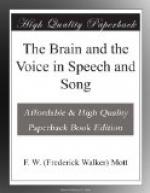I have on page 77 referred to Stricker’s views on the primary revival of words in the sense of movement of the lips and tongue. Mach ("Analysis of the Sensations”) says: “The supposition that the processes in the larynx during singing have had something to do with the formation of the tonal series I noticed in one of my earlier publications, but did not find it tenable. Singing is connected in too extrinsic and accidental a manner with hearing to bear out such an hypothesis. I can hear and imagine tones far beyond the range of my own voice. In listening to an orchestral performance with all the parts, or in having an hallucination of such a performance, it is impossible for me to think that my understanding of this broad and complicated sound-fabric has been effected by my one larynx, which is, moreover, no very practised singer. I consider the sensations which in listening to singing are doubtless occasionally noticed in the larynx a matter of subsidiary importance, like the pictures of the keys touched which when I was more in practice sprang up immediately into my imagination on hearing a performance on the piano or organ. When I imagine music, I always distinctly hear the notes. Music can no more come into being merely through the motor sensations accompanying musical performances, than a deaf man can hear by watching the movements of players. I cannot therefore agree with Stricker on this point” (comp. Stricker, “Du langage et de la musique,” Paris, 1885).
Of the motor type myself and having a fairly good untrained ear for music, I find that to memorise a melody, whether played by an instrument or by an orchestra, I must either try to sing or hum that melody in order to fix it in my memory. Every time I do this, association processes are being set up in the brain between the auditory centres and the centres of phonation; and when I try to revive in my silent thoughts the melody again, I do so best by humming aloud a few bars of the melody to start the revival and then continuing the revival by maintaining the resonator in the position of humming the tune, viz. with closed lips, so that the sound waves can only escape through the nose; under such circumstances the only definite conscious muscular sensation I have is from the effect of closure of the lips; the sensations from the larynx are either non-existent or quite ill-defined, although I hear mentally the tonal sensations of the melody. No doubt by closing the lips in silent humming I am in some way concentrating attention to the sensori-motor sphere of phonation and articulation, and by reactive association with the auditory sphere reinforcing the tonal sensations in the mind. The vocal cords (ligaments) themselves contain very few nerve fibres; those that are seen in the deeper structures of the cords and adjacent parts mainly proceed to the mucous glands. This fact, which I have ascertained by numerous careful examinations, is in accordance with




